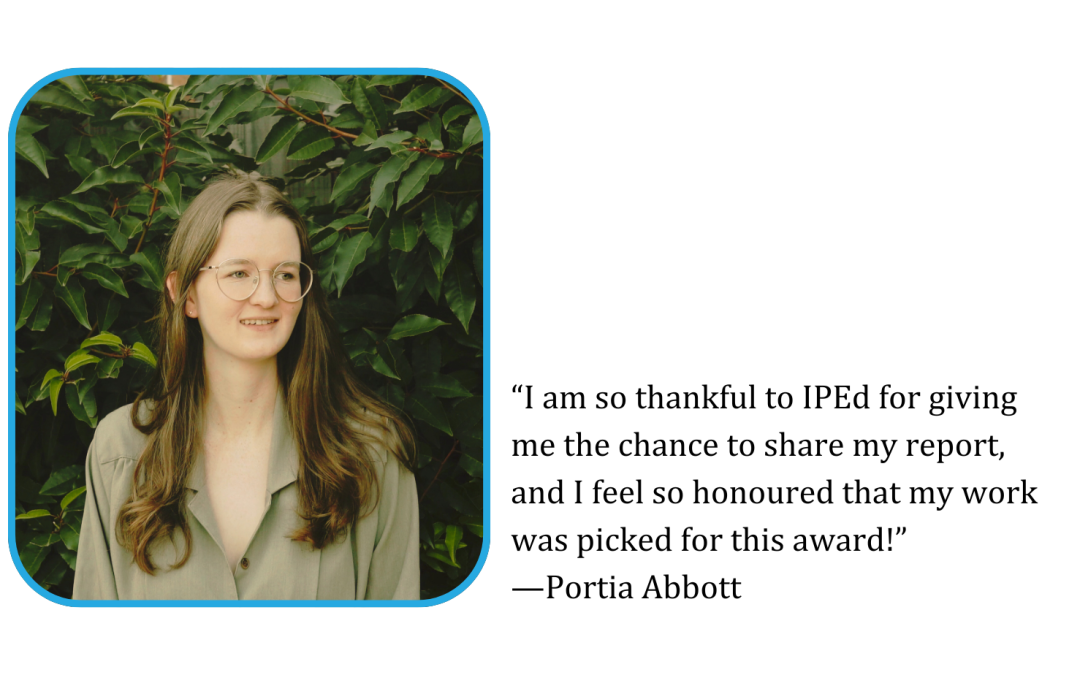The 2025 IPEd Student Prize was awarded to Portia Abbott, a student in the Master of Writing and Publishing program at RMIT University. Portia was awarded the Student Prize for “One book (doesn’t) fit all: suggestions for more dyslexia-friendly print books”, her industry report on what makes print text more readable for those with dyslexia. We spoke with Portia to learn more about her award-winning report and how her research turned a curiosity into a passion.
Portia first heard about the IPEd Student Prize through her university, but didn’t decide to enter right away. It was only after she started researching her topic that she decided to submit her work. When her report was shortlisted earlier this year, she says she was thrilled by the fact that others saw value in her work.
“As a grown adult with dyslexia, I realised how few supports existed for dyslexic readers outside of the classroom. I hoped that if my research report won, it might increase conversation in the publishing industry around dyslexia-friendly printing, as well as give some concrete advice that could be acted on right away,” Portia said.
“I tried to keep my expectations low, but I’d been hopeful because it was one of the few times I felt like I had hit upon something bigger than myself.
“I am so thankful to IPEd for giving me the chance to share my report, and I feel so honoured that my work was picked for this award!”
Filling the dyslexia research gap
Portis is hopeful that her work can go some way to filling the research gap that exists around dyslexia.
“I believe publishers haven’t addressed dyslexia because the research is incomplete, not from lack of interest,” Portia said.
“My report focuses on how to make print books more accessible to dyslexic adult readers. I began by pulling together previous studies about what makes books more readable for people with dyslexia – font size, inter-letter spacing, etc. – and created a rough criteria by which to judge printed books on their accessibility.
“I scrounged together as many Australian books as I could and measured each one by hand, including as many points of data as possible. I found that some books were already being printed in a more dyslexia-friendly format but that more than half were still inaccessible.”
Through her research, Portia discovered that in many cases, it was simple changes that would make books more accessible for readers with dyslexia.
“In fact, by setting the font size minimum to 12, line spacing minimum to 1.15, and increasing inter-letter and inter-word spacing by 7%, books would become considerably more dyslexia-friendly!”
From casual curiosity to a true passion
Portia learnt she had dyslexia when she was about five years old. But she says her knowledge of dyslexia had remained limited.
“I thought the industry report was a great opportunity to learn more about dyslexia, and through that, also myself. As my research progressed, I moved from casual curiosity to a true passion as I realised how simple it would be to make print books more accessible for dyslexic readers, and yet how little awareness there was about the issue and its solutions.”
For Portia, the Student Prize win is validation of her work but also, she hopes, inspiration for young people and children with dyslexia.
“To all the little dyslexic kids using bad handwriting and synonyms to hide their spelling, reading books under their grade level, and wondering why something they like so much seems so out of reach – I was you, and here I am now, editing and writing!
“The world is changing, and I’m so privileged to be here today, able to write about something that before felt insurmountable.”
What the judges said about Portia’s winning report
In their report, the judges noted that Portia’s entry focused on diversity and highlighted some of the gaps in the Australian publishing industry in catering for diverse audiences.
This is the kind of excellence and originality we are pleased to reward. The calibre of [Portia’s essay] goes beyond competent writing and editing, and shows insight and critical thinking about issues affecting the whole industry.
Overall, Portia Abbott’s work exhibited an impressive thoroughness of research with its mixture of qualitative and quantitative methods, together with the accuracy of the author’s editing and proofreading of their work, thus embracing the nature of this editorial industry prize.
Portia’s entry was submitted by RMIT course coordinator Zoe Dzunko and will be published on the IPEd website in the coming weeks.

